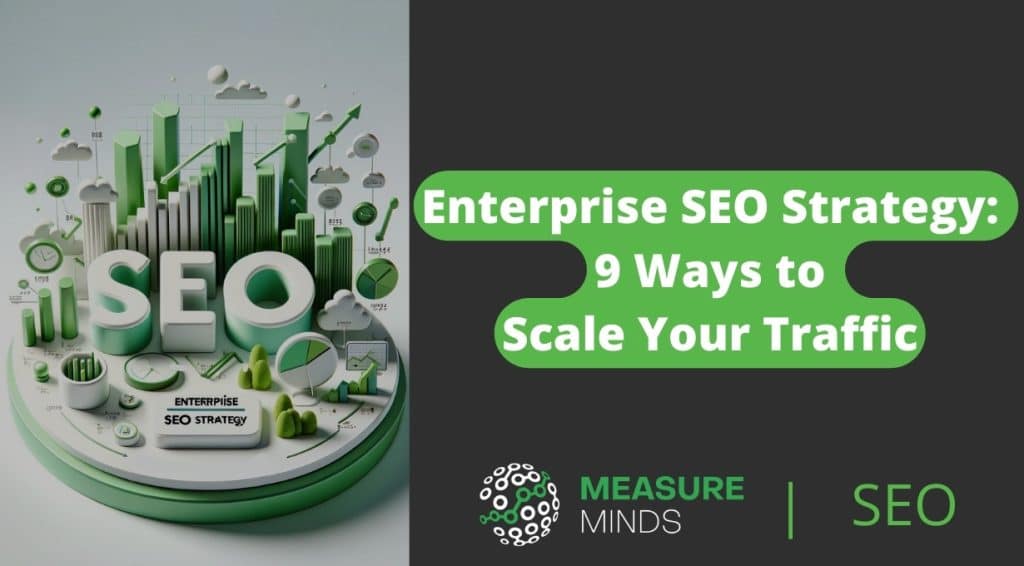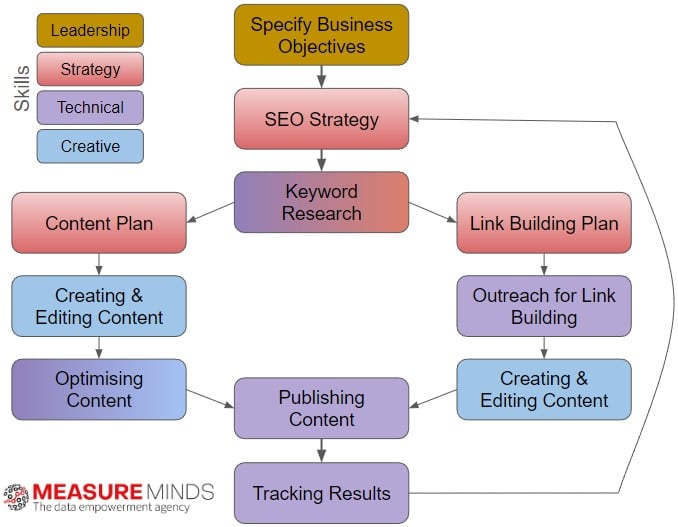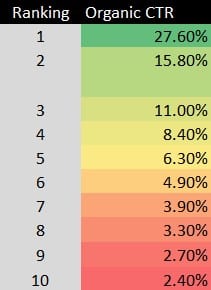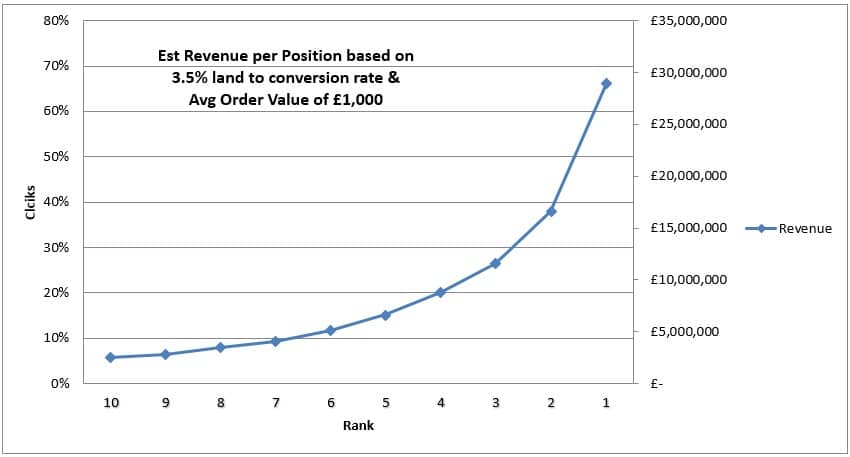
Enterprise SEO Strategy: 9 Ways to Scale Your Traffic
Enterprises have specific needs when it comes to SEO. Scaling is a major challenge, with larger websites, larger teams and extra layers of complexity.
On the average website, traffic from organic search adds up to more traffic than all other sources combined. This makes creating and implementing an SEO strategy a priority for any enterprise level website.
What is enterprise SEO?
Enterprise SEO (Search Engine Optimisation) is the process of creating targeted content and building authority backlinks to a large site in order to increase traffic and drive conversions.
The same principles of best SEO practices that apply to any site are still relevant. These include:
- Setting measurable goals and objectives.
- Researching keywords and creating content tailored to them.
- Improving technical SEO, particularly page speed.
- Placing editorial content on high authority websites in order to build backlinks.
- Tracking results and implementing ongoing improvements.
Where enterprise level SEO is different, is that you also need to create content at scale, have different team members contribute different talents, and apply a range of enterprise SEO tools to make project management decisions based on the best information available.
The most successful enterprise SEO strategies
With an enterprise level website, there are dozens of ways you could improve your SEO. Do you focus on specific web pages? Improve the Meta Tags across your whole site? Optimise existing content or create new content? How much difference will an innovative new feature for your website really make?
The answer is always, it depends. It depends on how good your existing SEO is, your exact website structure, and your business objectives.
So, what are some universal enterprise SEO strategies that are guaranteed to drive traffic and increase your conversion rate?
1. Create a specialist SEO team
SEO requires consultants, web developers, content writers and link builders. Each brings a specific set of SEO skills to the table. You would never ask a content writer to improve your page speed, yet there may be aspects of SEO you take for granted. This leaves a team member in charge of multiple tasks they may not have the training or expertise to perform well.
Looking at the content creation and link building aspects of enterprise SEO, the skill sets involved at different stages are as follows:

First ask, do you complete all the stages? If you omit any of them, you could be making a major SEO mistake.
Next, identify who within your organisation completes each task and whether or not they have the necessary skills. If not, either provide training, hire an expert with the relevant strategic, technical, or creative skills, or outsource the task to an enterprise SEO agency.
2. Create a smart SEO strategy
You may have heard of SMART goals, perhaps even learnt about them at school, however do you apply them in project management?
In the context of setting business goals for SEO campaigns, your objectives should be:
- Specific – Which keywords do you want to rank for? How much traffic to each section are you looking to achieve? What is your optimal conversion rate?
- Measurable – Have you configured Google Analytics, Google Tag Manager, and Search Console in order to accurately measure traffic and identify ways to improve conversions?
- Achievable – Are you targeting keywords with an SEO difficulty which is within your reach? Do you have the necessary resources to target the number of keywords you’ve selected? How much content and links can you reasonably create?
- Relevant – Will your goals deliver the optimal ROI and fit with the overall business objectives? Have you chosen high volume keywords that are likely to convert?
- Time-bound – Do you have an overall strategy and a content plan that takes you to a specific deadline?
3. Get team buy-in
In a small business, the owners either do their own marketing, or liaise directly with an SEO agency. For large companies, there’s a chain of command and multiple decision makers involved.
Getting team buy-in for SEO is essential, as it ensures you will get the funding you need, be it for your own marketing project, or a specialist enterprise SEO agency.
Organic traffic often accounts for more than half of a website’s visits, so I’m surprised when a business will invest hundreds of thousands on a Google Ads campaign, but will hesitate at spending £10K on SEO.
To get buy-in from the CEO and CFO, calculate the extra sales you will generate from an increased ranking. Rising in Google’s first page of results gives you a considerable boost in CTR:

The numbers for each business will vary, however with a business model as follows:
- Targeting keywords with a search volume of 100,000 a month.
- Ranking in position 10 on average at the start of your SEO campaign.
- 3.5% land to sale conversion rate.
- Average order value of £1,000.
The graph below shows what each increase in Google ranking would mean for your enterprise:

4. Begin your project with an SEO audit
Knowing where to focus your efforts is essential for your enterprise SEO strategy to succeed. By beginning with an SEO audit, you identify potential website issues and get an idea which improvements will deliver the maximum benefit.
We have created a 21-step guide to enterprise SEO audits. This covers strategy, content, technical SEO and backlinks. The audit will give you a clear understanding of the amount of work involved for each task and the likely return on investment. This way, you can prioritise your workload effectively, starting with easy-to-implement tasks that will give a substantial increase in traffic.
5. Choose specialised keywords
Large enterprises understand the importance of specialism when it comes to providing a service. This same mindset must be applied to keyword research.
Think in terms of keyword clusters – closely related keywords your target audiences might search for when looking for your product or service. Group synonymous keywords together and create, or allocate an existing page to each grouping.
Enterprise SEO platforms like Semrush specify whether a keyword is informative or commercial. Assign informative keywords to blog pages and commercial keywords to sales pages, this ensures you’re matching content to searcher intent.
6. Calculate your maximum achievable keyword difficulty
In terms of keyword difficulty, the lower the difficulty, the easier it is to rank for a specific keyword. Enterprises have well established sites, however, so can rank for more competitive keywords than most. How can you determine how difficult is too difficult?
To identify the maximum keyword difficulty, do the following:
- Open Semrush, Ahrefs, or another keyword tool.
- Enter your web address and filter out keywords that include your brand name.
- Export the report into an Excel spreadsheet or Google Sheets.
- Highlight the Position, Search Volume, and Keyword Difficulty columns.
- Click the Insert tab, then the drop-down arrow next to the Scatter Graph icon.

- Select Bubble Chart.
- Choose Search Volume for the bubble size.
The following shows a typical enterprise keyword difficulty bubble chart:

For this particular company, they are in the top 10 results for very few terms with a keyword difficulty over 50. We would recommend:
- Selecting the vast majority of keywords with a maximum difficulty of 50.
- Selecting a few keywords with a difficulty up to 70 if they are crucial to the business, high volume, and the site already ranks in the top 30 positions.
- Making a note of any priority keywords with a difficulty over 70 for a later point, once the site is ranking higher for some of the easier terms.
7. Use multiple SEO tools for different needs
We asked a range of marketing experts what their favourite SEO tools were and received 33 different answers. This illustrates the diversity of purposes that SEO tools fulfil. For any enterprise, we recommend as a minimum using the following, or working with an SEO agency who has access to them:
Google Analytics
Google Analytics is the industry standard in website data analysis. When configured correctly, it allows you to understand who your visitors are, how they interact with your website and what you can do to improve your conversion rate. It’s also free.
Google Search Console
Google Search Console lets you track your organic traffic, tells you which keywords and pages are generating clicks, and which pages are indexed in Google. It also tracks how fast your site is and which pages are mobile friendly. Like Google Analytics, it’s also free.
Semrush &/or Ahrefs
Semrush and Ahrefs are the two leading competitors in all-round SEO software. Having one or both of these is essential for SEO audits, content planning and competitor analysis.
Hotjar
Hotjar provides a way to visually see how visitors interact with your website. An essential tool for conversion rate optimisation.
Looker Studio
Looker Studio is an SEO reporting tool that converts complex data sets into user-friendly, interactive reports which are automatically updated. Perfect for keeping track of performance over time.
8. Create quality content at scale
Content creation starts with keyword research and a content plan. This ensures you don’t waste time creating content for keywords:
- You already rank for.
- It’s too competitive to rank for with your current domain authority.
- That are irrelevant to your business.
There are AI tools to help create content at scale, that can help you plan, proofread and improve content. To date, AI can’t write the content for you, as it is too generic and enterprises can’t risk including “hallucinations” on their sites.
According to a McKinsey & Company study on B2B SEO:
“57 percent of sellers say they don’t pay much attention to content produced by their marketing teams, feeling it is generic and unresponsive.”
How do you avoid this? How do you create post after post of engaging content?
- Hire experts who understand both your industry and SEO.
- Involve writers in your content strategy, so individuals can choose topics they’re most interested in.
- Suggest titles, article structures, and semantic keywords for each blog post or commercial text. This helps ensure variety between each piece of content and means your writers won’t inadvertently churn out similar texts.
- Regularly have a different person edit content using track changes and provide feedback to the writer.
- Collectively feedback which articles generate the most clicks and longest time on page. Reward the author of the highest achieving article from the previous month with a box of chocolates or a gift voucher.
All the above helps you create focused, high-quality content at scale.
9. Build quality backlinks at scale
In the early days of SEO, it used to be possible to build 100’s of backlinks quickly and achieve a boost in your rankings. Then came Google Penguin, an algorithm update that heavily penalised spammy backlinks.
This improved search results across the board, however it also made the whole link building process considerably more challenging. Nevertheless, backlinks are strongly correlated with ranking and traffic. Take a look at the table below, showing 5 of the largest mobile companies. Apple has literally billions of backlinks and 20 times more traffic than the nearest competitor.

Source: Semrush
Links from high authority sites will boost your position and traffic way more than other links. The first backlink from a site also carries more weight, as do links from articles containing relevant keywords.
To build quality links in bulk:
- Create something worth linking to – Be it thought leadership pieces, case studies, or free tools. These will generate links without you even needing to ask for them.
- Create content that’s easy to duplicate – Be it charts or infographics to include in articles, or other content you can reuse within blog posts. Note, the text itself needs to be unique for each guest post you write to avoid duplicate content issues.
- Target evergreen topics – “How to” articles and listicles have been shown to generate the most long-term traffic
- Outreach to high authority sites – Don’t message the same contacts over and over, instead spend time researching new potential contacts and request guest posts on their sites.
- Build relationships with journalists – Building your network of contacts with journalists is a great way to generate links from high-quality sites.
- Create contacts with influencers – If influencers mention you on social media, this can have a dramatic effect. For B2B services, LinkedIn is the best social media channel to use. For B2C sites, use a range of social media channels.
- Network with other departments – Communicate the importance of links to other departments, particularly PR. Ensure that whenever a news article mentions you in a positive light, you contact the editor to request a backlink.
While external backlinks are crucial, don’t underestimate the importance of internal linking. By linking to your landing pages from blogs and other related commercial pages, you strengthen their relevance and boost their ranking.
Conclusion
To scale your organic traffic, you must also scale your content and backlinks. The challenge is doing so without sacrificing quality.
While there are SEO tools that can help, it’s also necessary to create a qualified team who work harmoniously together. Identify where there are gaps in your team’s understanding of technical SEO, content creation and link building, then provide training, or hire additional resources to plug those gaps.
Don’t hesitate to contact us if you would like help creating and implementing your enterprise SEO strategy from a team of experts with 20 years of experience.
- How to Blend GA4 & UA Data Using BigQuery & Looker Studio - 12/07/2024
- How to do a Google Analytics 4 Audit & Mistakes to Avoid - 10/07/2024
- How to Backup & Visualize GA3 Data for Free - 27/06/2024
